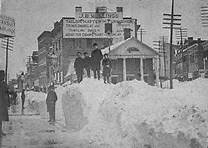
The End of Days
The month of April was a bit unsettled in Connecticut this year. First, we had the earthquake that no one expected, and then the eclipse that we had all been looking forward to. In days gone by, both of these events would have been interpreted as portents, signs from the earth and the heavens that some great change was upon us. Great change is upon us, or upon me, but neither the geological nor the celestial event brought it home to me as much as a local act of human destruction. In mid-April, the City of Waterbury raised the old Welton Street School to the ground.
In the preceding week, there had been a fire in the building, and though this structure had burned before, and sat empty for years afterwards, for some reason the latest fire galvanized the city into action. Within days of the fire engines clearing out, the wrecking balls arrived and demolished a building that had stood on Welton Street since 1883, a lovely old red brick school with rosettes under its eaves that was built before the Scovill Manufacturing Company operated the largest brass works in the world across the street. It was a school where generations of the immigrant children whose parents worked in these mills began their education.
When it was still standing, I passed this school twice a day on my way to and from my own school which is located on the hill above it, more often on days when I descended to get a mid-day coffee at the Starbuck’s in Barnes and Noble. I often fantasized about this building, about how it could be fixed up as the community center or the out-patient clinic that the neighborhood around it could certainly use. I don’t know when it stopped functioning as a school. It was used as the city’s welfare office until 1998, the year I began teaching in Waterbury, but by the time I started driving Welton Street every morning and afternoon even that had closed. From its days of operation, there remained only a portion of tattered plastic surround attached to a rickety metal staircase at the back of the building. Yet despite this sad remnant of previous occupation, and despite the front entrance porch that was caving in, the boarded up windows and doors, and the trees which grew wild and untended against its walls, the building remained handsome, even stately, if increasingly forlorn.
All of this, both the stately and the forlorn, was reduced in a matter of days to a pile of red bricks and cracked granite lintels, loaded into long trucks, and carted away. The wound in the earth that had been the school basement was backfilled, and the entire lot is now a featureless plot of smooth gray gravel.
I miss it. I miss sitting and waiting for the light on East Main to turn, as I stare up at the vines creeping across the school walls. I miss imagining the immigrant children who must have walked its halls calling to one another in Italian, Gaelic, or Lithuanian. I miss its evocation of an earlier time and a different way of life. This school’s destruction, more than anything else, has marked for me the end of my teaching days in Waterbury. It was a symbol of my fascination with the history of the city and with the kaleidoscope of cultures which has been both its challenge and its strength for more than a century.
My students know. They know that this is the last year they’ll sit with me, talking, learning new words, asking questions about the world. They know the teacher who’ll be taking over from me, and they like her, but it is nevertheless the end of something, and this they don’t care for. They dislike adults disappearing from their lives. Many of them have had enough of that already.
They ask gingerly, or bluntly, about my age and look shocked when I tell them that I’m sixty. This is the same age as their grandparents, or even their great-grandparents. They are fascinated by the under-structure of my hands, the autumnal definition of vein and bone that thinning skin provides. One first-grade boy reaches out from time to time to stroke the blue deltas that pulse quietly from my wrist to my fingers. He does this with reverence as if these little rivers were magic stones or the giving pelt of a favorite pet. His hands are warm and pleasant on mine, like the furtive nuzzlings of some friendly woodland creature.
“Your hands will look like this, too, one day,” I tell him.
“Nooooooo,” he cries. “This will never happen to me.”
I pray that it will happen, that he will live to be as old as I am, or even older. I pray that he will beat the relentless statistics for young men in the surrounding neighborhood.
Did the students who attended the old Welton Street School also wonder at the age of their teachers? Did they too doubt the passing of the years? Did they grow up, marry, move far away from the shadow of the brass works, or did they stay, follow their parents across the street to a job, and send their own children to the same school that they had attended?
In seven weeks, I’ll drive down the hill from my school for the last time as a regular employee of the city of Waterbury. I’ll drive past the empty lot that was once a school full of children and imagine their voices raised in play. These imagined voices, speaking the languages of the first waves of immigrants that broke upon Waterbury’s shores, will mix with the voices of the present immigrant children, many of them my students, who now live in the houses across the street. Italian and Spanish. Lithuanian, Portuguese and Dari. Voices full of laughter, hope, and plans for the future, rising up into the air, floating out over the rooftops, childish voices speaking the languages of the world, reaching for the sky.





A beautiful well written story.
Time certainly moves quickly and it’s nice to reminisce about the days gone by.
Well said Linda. You certainly captured a bygone era.I miss it too. It’s been said that the memories from your childhood are the ones that last. I grew up this area and often think of the streets, small businesses and colorful ethnicities. Great photo too!
Great story Linda! Reflecting on your personal passion which is teaching, guiding inspiring the young ones – a challenging and yet rewarding caeer .
Congratulations on reahing milestone!
Liben
Dear Linda, your writing is definitely moving, I hope you can appreciate your next retirement just as much.
An evocative image, Linda, which reminds me of my childhood as a German immigrant in Bridgeport having arrived there as a DP (Displaced Person) after WWII. I never experienced the warmth of a teacher such as you, however. May your retirement bring you more joy of good writing.
Beautifully and poignantly written, Linda. Best wishes to you in your retirement. I hope you make lots of time to write. Thank you for these wonderfully illustrated musings.
LIPEO,
Kristyn
I agree with the comments above, and the piece stirred my memories. I was obscurely pleased to learn that while the elementary school I might have gone to has been razed, the one I did go to is still in use as well as my junior high school and high school, which has be recently been restored to its original appearance. Ob the other hand, the corner drug store where I jerked sodas and manned the front counter is gone. In fact, the entire block—the music store, deli, movie theater, beauty salon, and more—is now a grassy plot.
Gosh, you are such a splendid writer, Linda! So sad to hear you are retiring…but I hope you will never give up writing
Just think of all the children whose lives you affected these many years. Sadly, there aren’t a lot of teachers like you. You really gave of yourself. These children will remember you the rest of their lives and I hope that will make you sleep well at night.